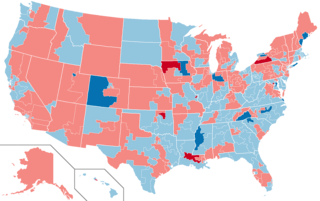
Edwin Jacob "Jake" Garn is an American politician and member of the Republican Party who served as a United States senator representing Utah from 1974 to 1993. Garn became the first sitting member of Congress to fly in space when he flew aboard the Space Shuttle Discovery as a payload specialist during NASA mission STS-51-D.

The 1986 United States Senate elections were elections for the United States Senate. Held on November 4, in the middle of Ronald Reagan's second presidential term, the 34 seats of Class 3 were contested in regular elections. The Republicans had to defend an unusually large number of freshman Senate incumbents who had been elected on President Ronald Reagan's coattails in 1980. Democrats won a net of eight seats, defeating seven freshman incumbents, picking up two Republican-held open seats, and regaining control of the Senate for the first time since January 1981. This remains the most recent midterm election cycle in which the sitting president's party suffered net losses while still flipping a Senate seat.

The 1974 United States Senate elections were held on November 4, with the 34 seats of Class 3 contested in regular elections. They occurred in the wake of the Watergate scandal, Richard M. Nixon's resignation from the presidency, and Gerald Ford's subsequent pardon of Nixon. Economic issues, specifically inflation and stagnation, were also a factor that contributed to Republican losses. As an immediate result of the November 1974 elections, Democrats made a net gain of three seats from the Republicans, as they defeated Republican incumbents in Colorado and Kentucky and picked up open seats in Florida and Vermont, while Republicans won the open seat in Nevada. Following the elections, at the beginning of the 94th U.S. Congress, the Democratic caucus controlled 60 seats, and the Republican caucus controlled 38 seats.

The 1986 United States House of Representatives elections was held on November 4, 1986, to elect U.S. Representatives to serve in the 100th United States Congress. They occurred in the middle of President Ronald Reagan's second term in office, while he was still relatively popular with the American public. As in most mid-term elections, the President's party — in this case, the Republican Party — lost seats, with the Democratic Party gaining a net of five seats and cementing its majority. These results were not as dramatic as those in the Senate, where the Republicans lost control of the chamber to the Democrats.

The 1916 United States Senate elections were elections that coincided with the re-election of President Woodrow Wilson. This was the first election since the enactment of the Seventeenth Amendment that all 32 Class 1 Senators were selected by direct or popular elections instead of state legislatures. Republicans gained a net of two seats from the Democrats, and then a furthered seat through mid-term vacancies thereby reducing Democrats to a 53-43 majority.

Earl Fredrick Landgrebe was an American politician and businessman who served as a Republican senator in the Indiana Senate and member of the United States House of Representatives. During the Watergate scandal he defended President Richard Nixon, which cost him his seat in the 1974 congressional election.

Douglas Wayne Owens was an American politician and a member of the United States House of Representatives for Utah's 2nd congressional district from 1973 to 1975 and again from 1987 to 1993.

Fernand Joseph St Germain was an American politician from Rhode Island. He was a member of the Democratic Party and served in the Rhode Island House of Representatives and the United States House of Representatives. He is best known for his sponsorship of the Garn–St. Germain Depository Institutions Act, which deregulated the savings and loan industry.

The 2008 United States House of Representatives election in Alaska was held on November 4, 2008, to determine who will represent the state of Alaska in the United States House of Representatives. Alaska has one seat in the House, apportioned according to the 2000 United States census. Representatives are elected for two-year terms; whoever was elected would serve in the 111th Congress from January 4, 2009, until January 3, 2011. The election coincided with the nationwide presidential election. The primary election was held August 26, 2008.

The 2010 United States Senate election in Utah took place on November 2, 2010, along with other midterm elections throughout the United States. Incumbent Republican U.S. Senator Bob Bennett was seeking re-election to a fourth term, but lost renomination at the Republican Party's state convention. Mike Lee proceeded to win the Republican primary against Tim Bridgewater and the general election against Democrat Sam Granato. As of 2021, this is the most recent U.S. Senate election in which a political party held the seat after denying renomination to the incumbent senator.

The 1974 United States Senate election in Utah took place on November 5, 1974 alongside other elections to the United States Senate in other states as well as elections to the United States House of Representatives and various state and local elections.

The 1980 United States Senate election in Utah took place on November 4, 1980.

The 1992 United States Senate election in Utah was held on November 3, 1992. Incumbent Republican U.S. Senator Jake Garn decided to retire instead of seeking a fourth term. Republican Bob Bennett won the open seat.

The 2012 United States Senate election in Pennsylvania was held on November 6, 2012, alongside a presidential election, other elections to the United States Senate in other states, as well as elections to the United States House of Representatives and various state and local elections. Incumbent Democratic U.S. Senator Bob Casey, Jr. ran for and won re-election to a second term, defeating Republican nominee Tom Smith, and Libertarian nominee Rayburn Smith.

The 2012 United States House of Representatives elections in Nevada were held on Tuesday, November 6, 2012 and elected the four U.S. Representatives from Nevada, one from each of the state's four congressional districts, an increase of one seat in reapportionment following the 2010 United States census. Representatives are elected for two-year terms; those elected will serve in the 112th Congress from January 2013 until January 2015. The elections coincided with the elections of other federal and state offices, including a quadrennial presidential election, and an election to the U.S. Senate. Primary elections were held on June 12, 2012.

Jacob Andrew Joseph LaTurner is an American politician serving as the U.S. representative for Kansas's 2nd congressional district. A member of the Republican Party, LaTurner was the 40th Kansas State Treasurer from 2017 to 2021 and a state senator from the 13th district from 2013 to 2017.

The 1988 United States House of Representatives election in Vermont was held on November 8, 1988. Republican nominee Peter Plympton Smith defeated independent candidate Bernie Sanders and Democratic nominee Paul N. Poirier.

The 2022 United States Senate election in Arkansas was held on November 8, 2022, to elect a member to the United States Senate to represent the state of Arkansas. Incumbent senator John Boozman was first elected in 2010, defeating Democratic incumbent Blanche Lincoln. Boozman was re-elected for a second term in the 2016 with 59.8% of the vote and ran in 2022 for a third term. Boozman won the May 24, 2022 Republican primary with 58.03% of the vote and subsequently defeated Democrat Natalie James in the general election by 34.64 percentage points. This was the best performance for a Republican senator in the state's history, and the third consecutive Republican win of this seat.

The 1960 United States Senate election in Tennessee took place on November 8, 1960, concurrently with the U.S. presidential election, as well as elections to the United States Senate in other states as well as elections to the United States House of Representatives and various state and local elections. Democrat Estes Kefauver won re-election, he defeated Republican A. Bradley Frazier.

The 2020 United States House of Representatives elections in Kansas was held on November 3, 2020, to elect the four U.S. representatives from the state of Kansas, one from each of the state's four congressional districts. The elections coincided with the 2020 U.S. presidential election, as well as other elections to the House of Representatives, elections to the United States Senate and various state and local elections.






















